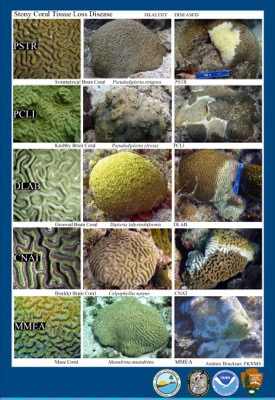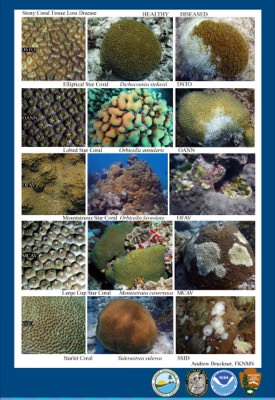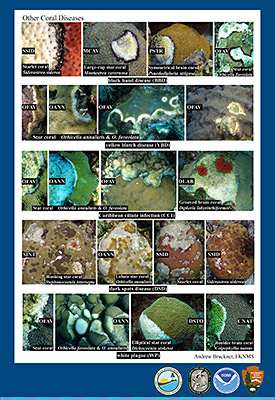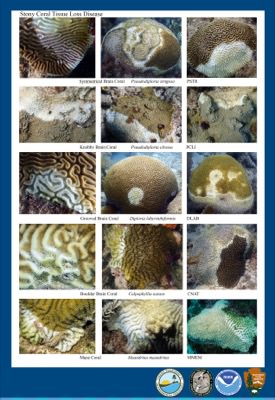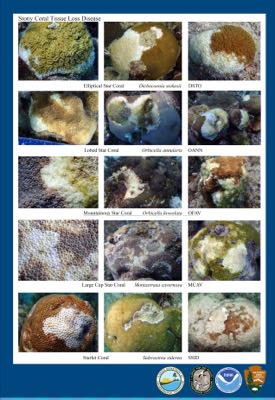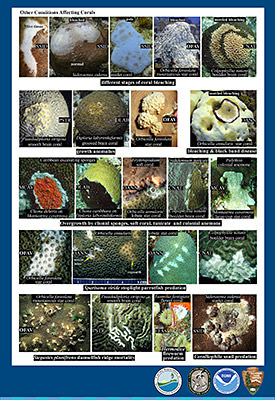Citizen Participation
Best Practices for Divers
Divers and snorkelers: Decontaminate your gear
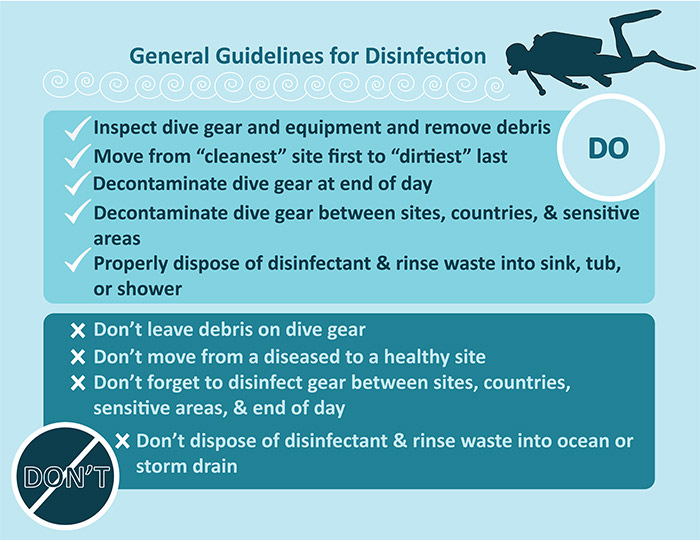
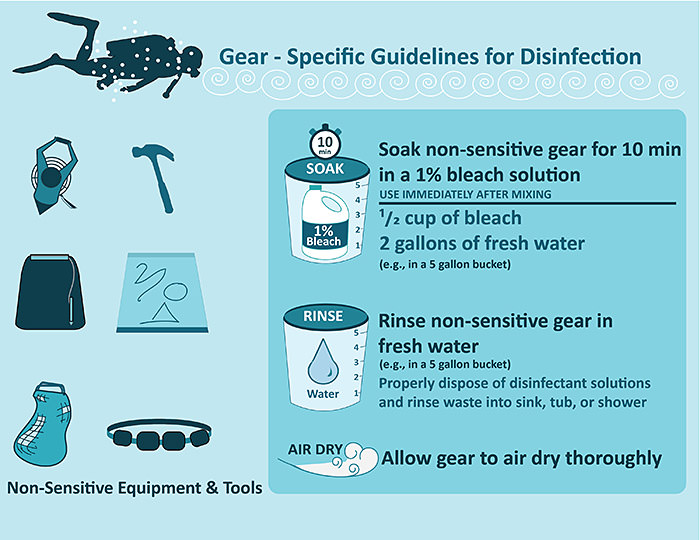
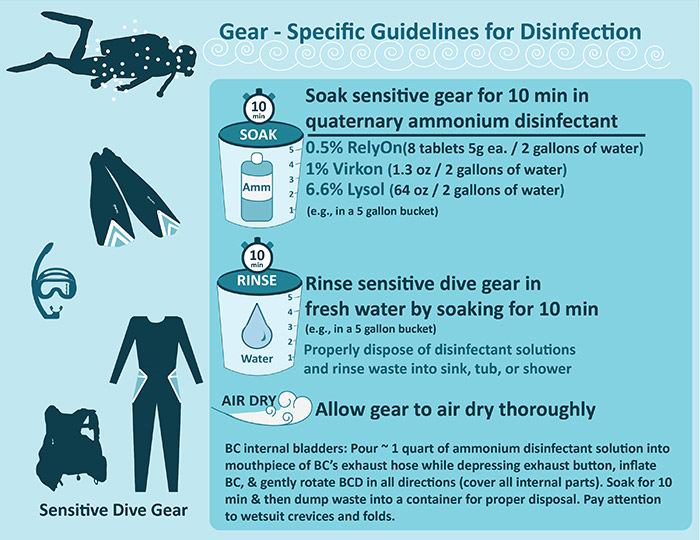
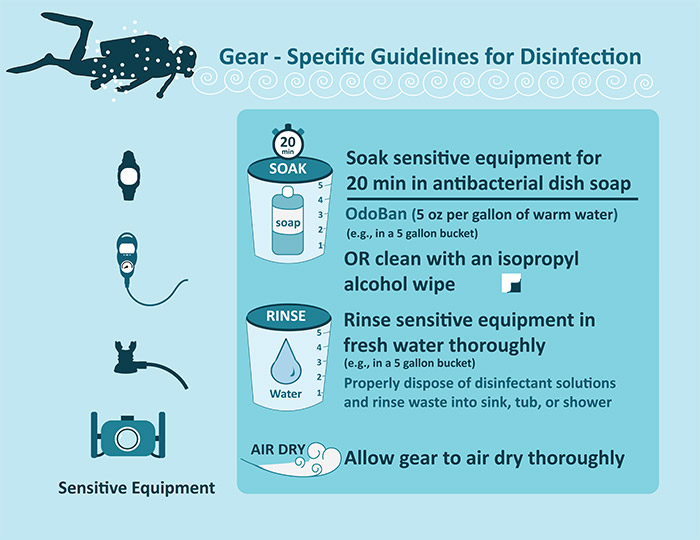
Divers and snorkelers can reduce their likelihood of transferring stony coral tissue loss disease through proper buoyancy, avoiding touching marine organisms and sanitizing equipment between dives and before and after each dive excursion, especially when travelling between countries or between infected and uninfected locations.
General Guidelines
- Remove debris and sediment following each dive.
- Between dives, sanitize gear that contacts corals with a bleach solution. Other gear should be washed in freshwater with an antibacterial soap.
- Use quaternary ammonium solutions to decontaminate dive gear after return to shore.
- Properly dispose of disinfectant solutions and rinse water in a sink, tub or shower. Never pour intothe ocean or a storm drain.
Gear-specific Guidelines
Non-sensitive equipment – After each dive, soak equipment (weight belts, tools, etc.) for 10 minutes in a 1% bleach solution (1/2 cup bleach per 2 gallons water). Rinse with fresh water; air dry.
Wetsuits, Buoyancy Compensation Devices (BCDs), mask and fins – After each dive, soak for 10 minutes in one of the following: 0.5% RelyOn (four 5 g. tablets/gal. water), 1% Virkon S (1.3 oz./2 gal. water), 6.6% Lysol (1 qt./gal. water), or an equal concentration of another quaternary ammonium disinfectant. Soak in fresh water for 10 minutes; air dry.
BCD internal bladders – Pour approximately ½ liter disinfecting solution into the mouthpiece of the exhaust hose while depressing the exhaust button, inflate BC, and gently rotate in all directions. Allow to sit for 10 minutes. Flush twice with fresh water.
Regulators, computers, gauges, underwater cameras and other sensitive scientific equipment – Soak for 20 minutes in a solution of warm water and antibacterial dish soap or OdoBan (5 oz./gal.). Rinse in fresh water; air dry. Additionally or alternately, thoroughly wipe with isopropyl alcohol.
This protocol does not endorse, recommend, or favor any specific commercial product, process, or service, or the use of any trade, firm or corporation name and is provided only to inform the public. Safety data sheets for chemicals and user's manuals for equipment developed by product manufacturers provide critical information on the physical properties, reactivity, potential health hazards, storage, disposal, and appropriate first aid procedures for handling, application, and disposing of each product in a safe manner.
Detailed Decontamination Guidelines
Have you seen this tag?

Divers and snorkelers in the Florida Keys can assist in monitoring the effectiveness of experimental treatments on diseased corals. You’ll find hundreds of tags on treated corals at Carysfort South, Key Largo Dry Rocks, Grecian, Molasses, Crocker, Sombrero, and Looe Key reefs. Snap photos of the tag, the whole coral colony and any lesions or lines, especially near any nails in the skeleton. Then, upload the photos to seafan.net/tags. The visuals will help scientists determine how the disease is responding to various treatments.
Observation
Be a citizen scientist by reporting what you see out in the water. Note your location and describe the coral condition. Include photos to assist scientists in determining areas that need investigation.
The Southeast Florida Action Network (SEAFAN) is a reporting and response system designed to improve the protection and management of Florida's Coral Reef.
Sea Grant Roving Diver Observations
Sea Grant-trained observers assist continued monitoring of the spatial extent of the disease by submitting in-water data.
Training Opportunities
BleachWatch is a citizen-science program designed to detect and monitor coral bleaching and disease in Southeast Florida. Classroom training is offered free to certified divers. To register, contact coral@FloridaDEP.gov.
The Stony Coral Tissue Loss Disease Observer Training engages the recreational diving community to increase understanding of the disease outbreak and teach divers how to identify species of stony corals for monitoring. The classroom-based training is free and can be paired with an optional, paid, in-water training to enhance learning of organism identification and coral condition. Trained observers will be able to assist in monitoring the spatial extent of the disease as well as reef recovery. Businesses and organizations can arrange to hold trainings by contacting Florida Sea Grant Extension agents Shelly Krueger and Ana Zangroniz.
Disease Identification Cards
These downloadable ID cards are provided to assist in properly determining if a coral colony is affected by stony coral tissue loss disease. Because this disease can resemble other coral diseases, it is important to distinguish for purposes of accurate reporting.
Stress Relievers
- Use reef-friendly sunscreen
- Avoid anchoring by using mooring buoys where available
- Contain your trash
- Reduce runoff into storm and wastewater drains
- 10 ways to protect coral reefs
- How does land-based pollution threaten coral reefs?
Florida Coral Crew
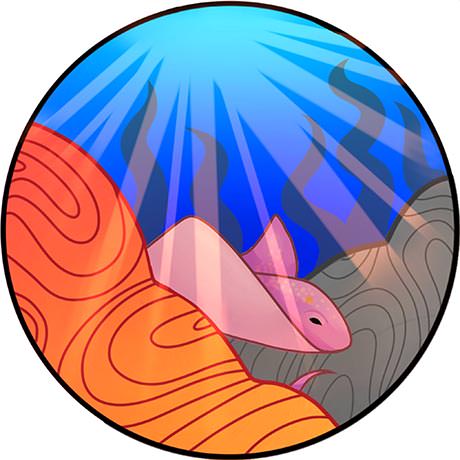
The Florida Fish and Wildlife Conservation Commission launched a campaign to educate the public and conserve Florida's coral reefs.
Anyone can join the Florida Coral Crew to help support healthy, beautiful ecosystems and restore corals affected by disease. Florida Coral Crew members will help raise awareness about the disease and recruit others interested in helping.
Here's what you can do today:
- Visit FLCoralCrew.com to join.
- Avoid touching corals while diving for lobster.
- Don't anchor near corals.
- Clean diving gear.
- Use environmentally-friendly sunscreens.
Sign up for Disease Updates
The Stony Coral Tissue Loss Disease Response Team sends a quarterly bulletin to provide high-level updates on the disease outbreak and response efforts with a focus on Florida. To receive this quarterly bulletin, send a request to Coral@FloridaDEP.gov with the subject line "Sign me up for SCTLD bulletin."
Reef Ambassador Program
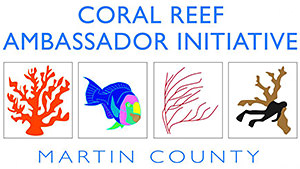
Five Southeast Florida counties have developed a regional program to help tourists, boaters and divers understand how they can help conserve and protect our reefs. By following the Reef Ambassador’s simple set of easy to remember rules, you too can help defend the reefs and become a Coral Champion.
Join the #RespectOurReef Movement
Visit Respect Our Reef for tips about smart diving and fishing practices and take the online pledge. The campaign and website are presented by The Nature Conservancy and the Florida Reef Resilience Program, a consortium of federal and state reef management agencies, nonprofit organizations, science and educational institutions committed to protection and sustainable uses of Florida's coral reefs, with funding from NOAA.
FWC Foundation Supports Coral Science
The Florida Fish and Wildlife Foundation is committed to long-term restoration of Florida’s reefs. We work with FWC, The National Fish and Wildlife Foundation, NOAA, and others to combat coral disease, establish long-term monitoring of reef restoration efforts, and identify breakthrough strategies that will substantially reduce lionfish numbers throughout Florida waters, the Gulf of Mexico, and the Caribbean.


